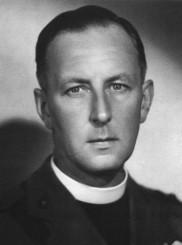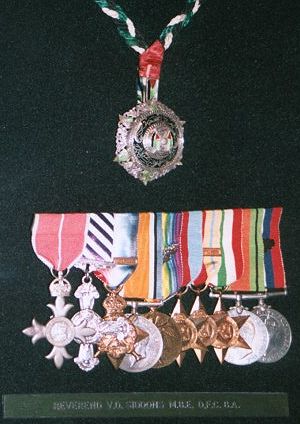
|
The Reverend V. D. Siddons
|
| [ Home ] | [ Back ] | [ Glossary ] |

|
V.D.Siddons joined the Northamptonshire Yeomanry (Territorials) three years before the outbreak of the 1st World War. During this time he was training to be a Minister in the Methodist Church.
With the outbreak of war he went with the 8th Division qualifying for the 1914 Star with Aug- Nov clasp. He came home to take a commission and after nine months in France was then sent to the Middle East to the 1/4th Battalion Northamptonshire Regiment.
He then transferred to the Royal Flying Corps and soon qualified as a pilot. He spent some time on the Sinai Front, where he took the first photo's of Gaza from the air.
He was then sent down to join "C" Flight of 14 Sqn RFC in the Hejaz where they and a few British troops were co-operating with the Arabs. He was stationed in the Hejaz for two years, the last six months of which he commanded the RAF (as it had become) detachment in that area. For his work he was awarded the DFC and was Mentioned in Despatches and also awarded the Order of Al Nahda by the King of the Hejaz.

|
In his diary for 1916 and his Army Book 136 (Log Book) reference is made to him acting as a pilot for Lawrence of Arabia, this is also referred to in Lawrence's book The Seven Pillars of Wisdom.
After the war he completed his training for the Ministry and served in various Methodist circuits until the outbreak of the 2nd World War. (See copy of note in research file signed by Salmond thanking him) In February 1939 he was given a commission in the Regular Army Reserve of Officers as a Chaplain and was called up in December 1939. The next month saw him in France with the 1st Battalion The Duke of Wellington's Regiment. He was eventually evacuated from Dunkirk.
After a year in England he went again to the Middle East and in Egypt he was posted to the 8th Army as Senior Chaplain to the 13th Corps. He later became Staff Chaplain at 8th Army headquarters. When the British troops left North Africa he went with them to Greece as Deputy- Assistant Chaplain General. He was in Athens when the Communist troubles broke out in December 1944. For his services in this area he was awarded a Mention in Despatches and was awarded an MBE (Military).
After the war he became Superintendent of the Bath Road Circuit and President of the Swindon Council of Churches.
Order of the British Empire (OBE), London Gazette 18 Feb 1943 (Member) Military.
For valuable services as Staf Chaplain. This Chaplain has worked with untiring persistance to keep track of the intricate movements of Units and Chaplains and secure that a ministry was available for all Troops. His special action was to carry single- handed the whole administretion of the R.A.Ch.D. Eighth Army when D.A.Cs.G. were removed from Corps. The difficulty of this solitary task was very great, and carried through only by long hours and sheer esprit de corps. To the pains he has taken to master the detail of Army administration the R.A.Ch.D. owes very much.
Distinguished Flying Cross (DFC), London Gazette 1 January 1919
His Majesty the King has been graciously pleased to approve of the under mentioned rewards to officers and other ranks of the Royal Air Force in recognition of distinguished services during the war.
1914 Star with Aug-Nov Clasp, Named to 1153 Pte. V.D.Siddons 1/1 North'n Yeo.
Entry into theatre of war 6 Nov 1914
War Medal Named to Capt. V.D.Siddons R.A.F.
Victory Medal with Mentioned in Despatches Oak Leaves, Named to Capt. V.D.Siddons R.A.F.
London Gazette 17 September 1917.
1939/45 Star Unamed as issued.
Africa Star with 8th Army Clasp Unamed as issued.
Italy Star Unamed as issued
Defence Medal and War Medal with Mentioned in Despatches Oak Leaves.
Unamed as issued.
London Gazette 23 May 1946.
Order of Al Nahda 4th Class, London Gazette 1 April 1920.
Awarded for his rendering glorious services and great tasks.
| [ Home ] | [ Back ] | [ Glossary ] |